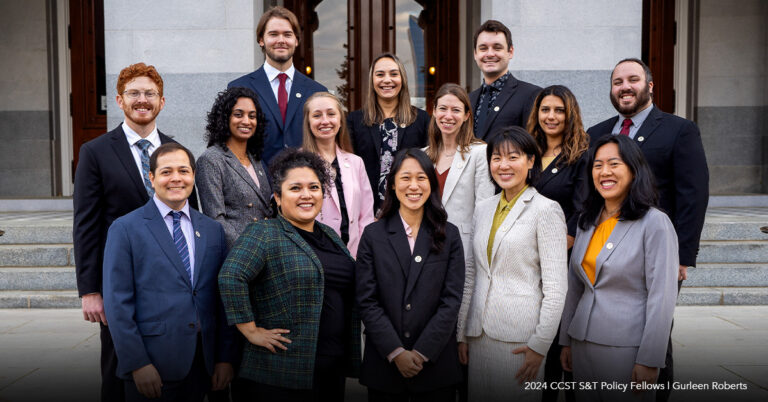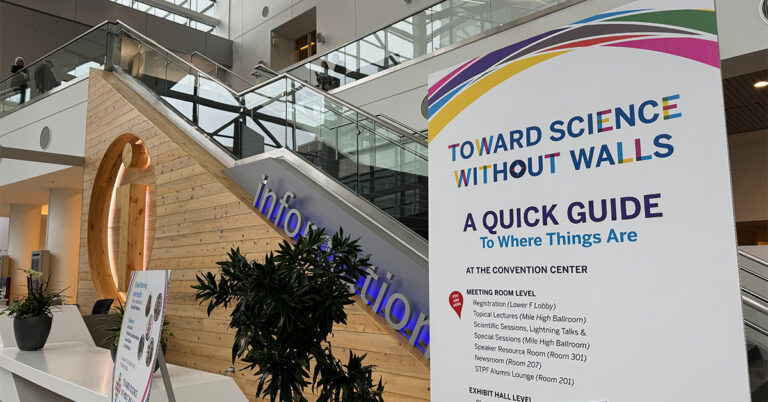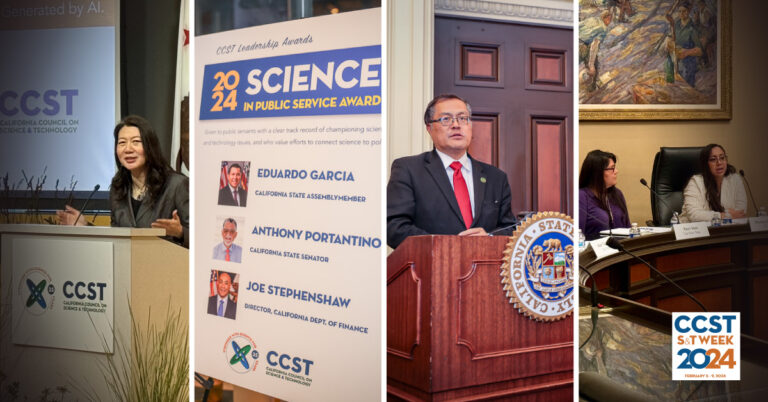Update: Applications for the CCST Science & Technology Policy Fellowship Have Closed
Presidential Science Advisors Benefit from CCST Policy Fellow Alum
February 16, 2012 | CCST Newsroom, CCST S&T Policy Fellows | Contact: M. Daniel DeCillis

The California Council on Science and Technology (CCST) is one of very few state-level organizations in the nation designed to offer expert advice to the state government and to recommend solutions to science and technology-related policy issues. There are some issues however which need to be addressed at a national, rather than state, level. One alumna of the CCST S&T Policy Fellows program has been learning exactly what the differences are between the two.
Amber Hartman Scholz was a member of the first class of Fellows, in 2009-10. She brought a Ph.D. in biology from Johns Hopkins and a drive to contribute to policy discussions to the California State Senate Environmental Quality Committee. Now, she is the Assistant Executive Director for the President’s Council of Advisors on Science and Technology (PCAST).
“My experience in California was tremendous,” said Scholz, “but even so, coming to work for PCAST has been a whole other ball game. It’s an entirely different scope of operations.”
PCAST is an advisory group of the nation’s leading scientists and engineers who directly advise the President and the Executive Office of the President. PCAST draws upon the same sorts of experts as CCST – in fact, two PCAST members (Maxine Savitz and Edward Penhoet) are CCST Senior Fellows. PCAST’s focus and approach however are somewhat different than that of CCST.
“Many economic issues, including federal science and technology R&D investments, have to go through Congress and the White House,” said Scholz. “For these areas, PCAST’s input may have a significant impact — setting the national stage for maintaining America’s leadership in advanced manufacturing, for example. In other areas, such as science, technology, engineering and math (STEM) education, there aren’t many Federal actors to implement policy, although PCAST can certainly provide input into the national discussion. In those cases, it’s the states and universities that set the lead for implementation.”
California in particular helps lead the way in many S&T policy debates at the state level, notes Scholz, pointing to the state’s legacy of trend-setting environmental legislation.
“Just recently, jewelry manufacturers nationwide have begun taking products with detectable amounts of cadmium off the market, not due to federal standards, but because of stricter standards in California,” said Scholz. “The sheer size of its economy gives the state a lot of clout.”
She feels that the S&T Policy Fellows program provided her with valuable experience for working in the White House.
“It’s an incredibly useful thing for relatively young scientists to train and receive input with the State legislature,” said Scholz. “To be an effective science advisor, you need to learn how government works and the limitations of both government and science.”
Her advice to others seeking a path in science policy advice is twofold.
“First, be the best darn scientist you can be,” she said. “The quality of your research gives you credibility, and understanding how academia works and research is done is a skill set that will always remain with you, even if you enter the policy arena instead.”
“Second,” she added, “read your newspaper! Understand that politics and policy can be hard to separate. Get a sense of what S&T issues are being discussed, and how the role of science is being portrayed. With these two things in mind, you can gain a good idea of where policymakers need to start, and what they need to know to make good S&T policy decisions.”






